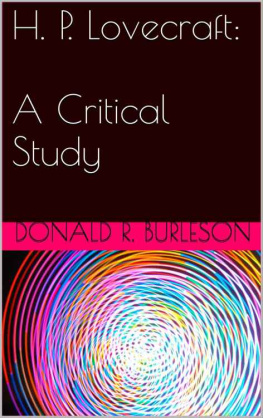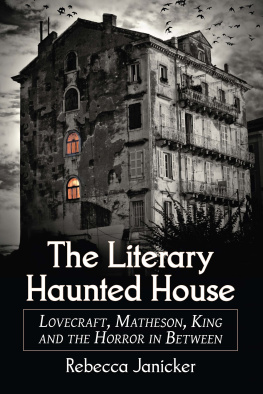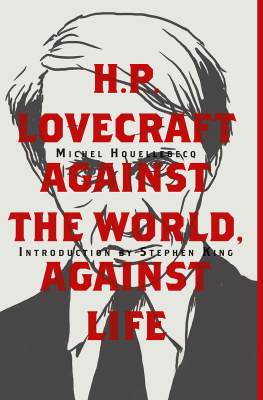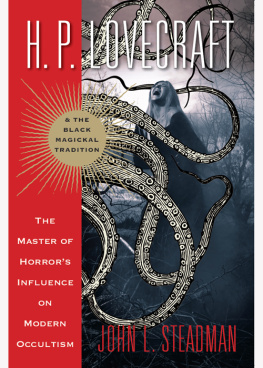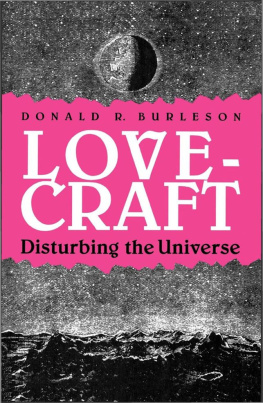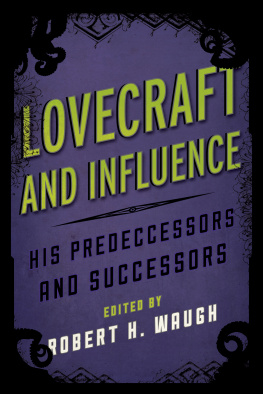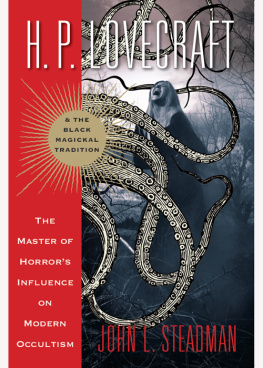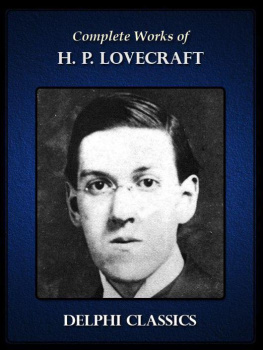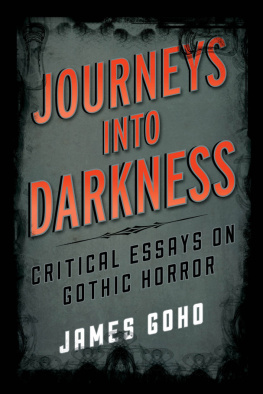H.P. Lovecraft: A Critical Study
DonaldR. Burleson
Hippocampus Press
New York
H. P. Lovecraft: ACritical Study copyright 2016 by Donald R. Burleson.
Revised and updatedelectronic edition copyright 2016 by Hippocampus Press.
Originally publishedby Greenwood Press, 1983.
Published byHippocampus Press
P.O. Box 641, NewYork, NY 10156.
http://www.hippocampuspress.com
All rights reserved.
No part of this workmay be reproduced in any form or by any means without the writtenpermission of the publisher.
Hippocampus Presslogo designed by Anastasia Damianakos.
First electronicedition, 2016
Contents
Preface
Thepresent volume is an attempt to bring serious critical scrutiny tobear on an author whose works in the field of fantasy horror, though they have enjoyed variouskinds of popularity, have heretofore been afforded relatively littleattention in the realm of literary criticism. H. P. Lovecraft was notonly a writer of highly worthy and unique stories, novels, and poems;he was a philosopher of genuinely incisive perception, an essayist ofmuch persuasive power, a literary critic, and an epistolarian whoseequal is scarcely to be found. However, the present study shall, ofnecessity, focus on Lovecraft the writer of fiction asi lluminated by his works, hisself-criticism in his many letters, and the literary influences thathelped shape him as a fantaisiste of the first water. Like Poe, Lovecraft is a deserving writer whoseemergence as an accepted and admired artist has been slow in coming;but come it must.
A blended variety of criticalapproaches will be employed here, in the belief that no singleschool of criticism is capable of bringing out morethan a fraction of the worth in an authors effusions. Whileformalist philosophical, and biographical schools of criticism castlight, each in its way, on Lovecrafts writings, a number ofworks lend themselves equallywell to Jungian and mythic-archetypal criticism. Following the great Northrop Frye, one must allow that a work of fiction belongs asmuch to the reader and critic as to the authorthat in seekinginterpretations and critical discernments of a work, one need notconfine oneself to those things of which the author was certain tohave been consciously aware. Indeed, Lovecraft himself, thoughwriting more for himself than critics or readers, largely subscribedto this view, remarking in a letter of 7 November 1930 to ClarkAshton Smith: As for the unconscious element in composition... I agree with you that it is really veryconsiderable. The present study brings a number of criticalapproaches to bear on Lovecraft and attempts to present a balancedviewfor no matter how much one admires an authorswriting, no matter how certain one is that an emerging author shallcome in time to have his greatness more generally acknowledged, onemust recognise that any writer is somewhat uneven, that in allhonesty some works are decidedly less worthy than others.
The organisation of this study isessentially chronologicalthis approach being far lessproblematical than, say, a thematic grouping of the worksinthe sense that the chapters run in a chronological sequence ofperiods and the stories chosen for main critical treatment withineach chapter are treated, except for occasional groupings ofconvenience, in the order in which they were written (which is oftenquite different from the order in which they were published).However, in each chapter a number of works not treated in thechapters main sections are grouped together at the end forsomewhat lighter critical treatment under the classification OtherWritings. This classification does not necessarily imply ageneral value judgment against these works, for although some few ofthem (for example, Herbert WestReanimator) arefrankly inferior to the mainstream of the Lovecraft canon, a goodmany others (for example, The Strange High House in the Mist)are excellent. Rather, this mode of classification recognises that,in a study of this length, not every work can be afforded equallyextensive treatment and that, even among works of high general merit,not all stories provide critical potential equally illuminative ofLovecraft. (One can scarcely claim, for example, that there is asmuch interpretative potential in the splendid prose poem Whatthe Moon Brings as there is in The Dunwich Horror.)Further, this mode of organisation provides an opportunity to commenton a little of Lovecrafts poetry in each period. Although itis not primarily for his poems that Lovecraft will be remembered,they do shed additional light on his nature as an imaginativeartistespecially considering that in a sense Lovecraftsfictional style is an outgrowth of his poetic instincts, much as canbe said for Faulkner.
Since Lovecraft had a hand in avoluminous mass of revision (ghostwriting) piecesduring his careerto the extent that in all likelihood we shallnever know all the facts concerning exactly what he ghostwrote, orfor whomand since much of this writing is decidedly inferiorto his primary work and was produced under artistically artificialcircumstances, no attempt has been made here to cover the bulk ofLovecrafts writing bearing the bylines of other writers.Exceptions are the Houdini piece and two works written for ZealiaBishop; in particular, The Mound is a major pieceforming an important element in the Lovecraft Mythos.
The writers who to some extentinfluenced Lovecraft are numerous. For the most part the influencesare very slight, but important influences are to be discerned in thecases of Poe, Hawthorne, Dunsany, and Machen; it is argued in thefinal chapter that Lovecraft derives certain central points ofinfluence from each of these writers, assimilating them toLovecraftian purposes of high originality. Decidedly, Lovecraft as fantaisiste is agreat deal more than the sum of his parts.
This study is the first full critical survey of Lovecraftsfiction ever published. As one who has studied Lovecrafts worksince 1955, I may, however, make bold to predict that criticalattention to the gentleman from Providence will expand with thepassage of time. Lovecraft will endure.
Acknowledgments
Iwish to thank: Arkham House Publishers, Inc., Sauk City, Wisconsin,for their kind permission to quote from the writings and letters ofH. P. Lovecraft.
Special thanks go to Lovecraftscholar and friend S. T. Joshi for the many varieties of insight andassistance given me along the way. I am especially glad to have hadhis Index to the SelectedLetters, without whichthe writing of the present volume, with its dependence on nearly athousand otherwise unindexed Lovecraft letters, would have beenvirtually impossible.
I give thanks to all those friendsand colleagues whose encouragement has so furthered the progress ofthis book. I thank Dr. John and Ann Dixon, of the house in Vermontthat I was able to identify as the Akeley house, for their kindhospitality and interest in my work. In particular, I thank my friendDonald Wandrei for his invaluable assistance and encouragement.
I am indebted to the highlyprofessional editorial staff at Greenwood Press for the splendid jobthey have done in the production process; they have been a pleasureto work with.
Loving thanks go to my wifeMollieherself a serious Lovecraftianwho endured myreading most of this volume aloud to her and offered many helpfulcomments, and to whom the work is dedicated.
Finally, thanks go to the lateHoward Phillips Lovecraft for having lived and writtenforhaving remained true to his artistic principles, for having enrichedthe lives of all who shall read him.
I. Howard Phillips Lovecraft
HisLife in Brief
Howard PhillipsLo vecraft stands as a figure uniquein all of literature. His strangely fertile mind has produced acorpus of stories, novels, and poems whose nature transcends facileclassification; to say merely that he wrote horror storiesis to miss much of the depth of conceptualisation that pervades hiswork, work characterised by intensely mood-evoking narrative power.Like all human beings, Lovecraft is a complex tangle of facets andcontradictions, but his literary legacy to us is one that isnevertheless rich in its interpretability and in its capacity solidlyto hold and charm the mind. One can like or dislike Lovecraft and hiswritings, but one cannot forget or ignore them, or fail to find themworthy of thoughtful scrutiny. One does not simply read Lovecraft;one rereads and ponders himone is haunted by him.
Next page
